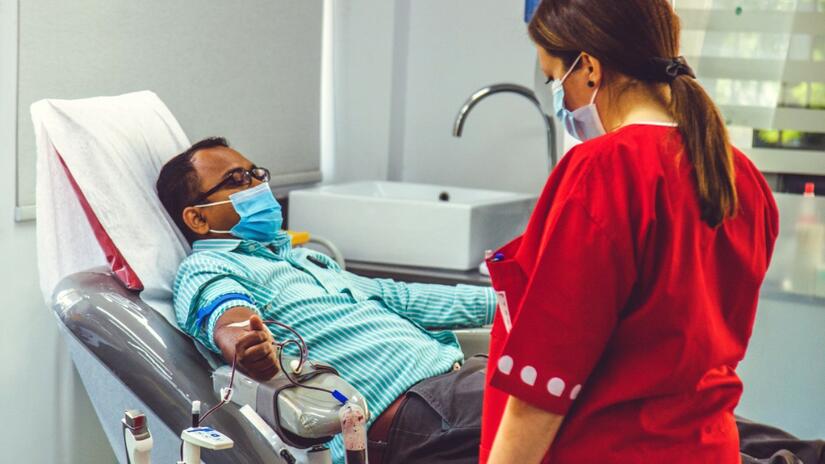Beirut, February 12, 2021 — The World Bank and the International Federation of Red Cross and Red Crescent Societies (IFRC) have signed today an agreement for the independent monitoring of Lebanon’s COVID-19 vaccination campaign. Under this agreement, IFRC acting as the Third Party Monitoring Agency (TPMA), will be in charge of independently monitoring the compliance of the vaccination deployment with national plans, international standards and World Bank requirements in order to ensure safe handling of the vaccines, as well as fair and equitable access to all.
According to the agreement, IFRC’s oversight and supervision will cover COVID-19 vaccine supply chain management as well as vaccine administration at vaccination sites from the technical, environmental and social safeguards perspectives. This includes but is not limited to storage, stock and temperature maintenance across the supply chain, service delivery at vaccination sites, eligibility of vaccine recipients and capturing client perspectives and feedback. The agreement will extend through December 2021 and may be prolonged as needed.
This agreement will cover the roll-out of vaccines to be procured under World Bank financing made possible through the re-allocation of US$34 million under the existing Lebanon Health Resilience Project to help Lebanon as it faces an unprecedented surge in COVID-19 cases. This re-allocation was the first World Bank-financed operation to fund the procurement of COVID-19 vaccines and will cover over 2 million individuals. In a first phase, this financing will cover the purchase of 1.5 million vaccines (750,000 individuals) from Pfizer, and the first batch is expected to arrive to Lebanon on February 13, 2021.
“Lebanon is embarking on an unprecedented large-scale acquisition and deployment of COVID-19 vaccines with its health system already under severe strain from the COVID-19 pandemic, a deep and prolonged macroeconomic crisis and lastly the devastating Port of Beirut explosion,” said Saroj Kumar Jha, World Bank Mashreq Regional Director. “The World Bank’s partnership with IFRC aims to ensure fair, broad, and fast access to COVID-19 vaccines to help save lives and support economic recovery while ensuring strict compliance with the safeguards in place.”
In preparing for vaccine deployment, the Government of Lebanon, with the support of the World Bank and other partners, has conducted the COVID-19 vaccine readiness assessment, established a National COVID-19 Vaccine Committee, and prepared a National COVID-19 Deployment and Vaccination Plan (NDVP). The NDVP has all the key elements recommended by the World Health Organization (WHO) and represents a central part of Lebanon’s vaccination readiness. According to the NDVP, Lebanon seeks to vaccinate 80 percent of the total population (citizens and non-citizens residing in the country). Vaccination will prioritize high risk populations through a multi-phase roll-out plan in line with WHO recommendations: high risk health workers, population above 65 years of age, epidemiological and surveillance staff, and population between 55-64 years with co-morbidities. By prioritizing these groups, the country’s vaccination program has the potential to reduce the consequences of the pandemic. Any exception to these priorities will jeopardize the efficiency, transparency and credibility of the vaccination plan.
“As a neutral independent international organsiation, we look forward to working with the World Bank on this important project to monitor the vaccine implementation plan and enable the public health authorities to ensure safe handling of the vaccines, as well as fair and equitable access to all,” said Dr. Hossam Elsharkawi, IFRC MENA Regional Director. “Only through strong partnerships, we can overcome the multi-layered crisis in Lebanon.”
IFRC will use mixed methods for data collection including the monitoring of mobile data platforms to ensure real time data collection and analysis, in person observations and monitoring using checklists, in person monitoring, reporting and reconciliation of daily stock count. In addition, IFRC teams will monitor social media and analyze the data from the call center set up by the Ministry of Public Health as part of the Grievance Redress Mechanism established under the project.
In addition to the TPMA, the WB has established, in consultation with WHO, UNICEF, IOM, UNHCR and UNRWA, an international Joint Monitoring Committee to engage in the monitoring of the vaccination process, identify measures to enhance the quality of the campaign, and ensure joint advocacy throughout the process, based on findings from the TPM and other sources.
The World Bank reiterates its commitment to ensure the strict enforcement of the vaccination plan and the continuous and stringent monitoring of its implementation to help Lebanon contain the pandemic as promptly and efficiently as possible.
--------
The World Bank, one of the largest sources of funding and knowledge for developing countries, is taking broad, fast action to help developing countries respond to the health, social and economic impacts of COVID-19. This includes US$12 billion to help low- and middle-income countries purchase and distribute COVID-19 vaccines, tests, and treatments, and strengthen vaccination systems. The financing builds on the broader World Bank Group COVID-19 response, which is helping more than 100 countries strengthen health systems, support the poorest households, and create supportive conditions to maintain livelihoods and jobs for those hit hardest.
The International Federation of Red Cross and Red Crescent Societies (IFRC) is the world’s largest humanitarian network, comprising 192 National Red Cross and Red Crescent Societies working to save lives and promote dignity around the world.
Press release
IFRC Global COVID-19 study: vaccine bank an ‘essential element’ of next pandemic response
IFRC Global COVID-19 study: vaccine bank an ‘essential element’ of next pandemic response
| Press release

